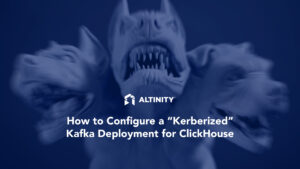How To Configure A ‘Kerberized’ Kafka Deployment For ClickHouse®
Learn how to configure Kerberos for Kafka and ClickHouse to benefit from a centralized authentication and authorization service. This article explains how to deploy Kafka, Zookeeper and Clickhouse and configure them to authenticate via Kerberos showcasing the process with a…





![[Joint-Webinar] How to Build Fast, Scalable Application Monitoring using Open Source](https://altinity.com/wp-content/uploads/2023/01/Product-Webinar-Jan-241-300x169.png)
![[Webinar] Own your ClickHouse® data with Altinity.Cloud Anywhere](https://altinity.com/wp-content/uploads/2022/12/Product-Webinar-Jan-17-300x169.png)




